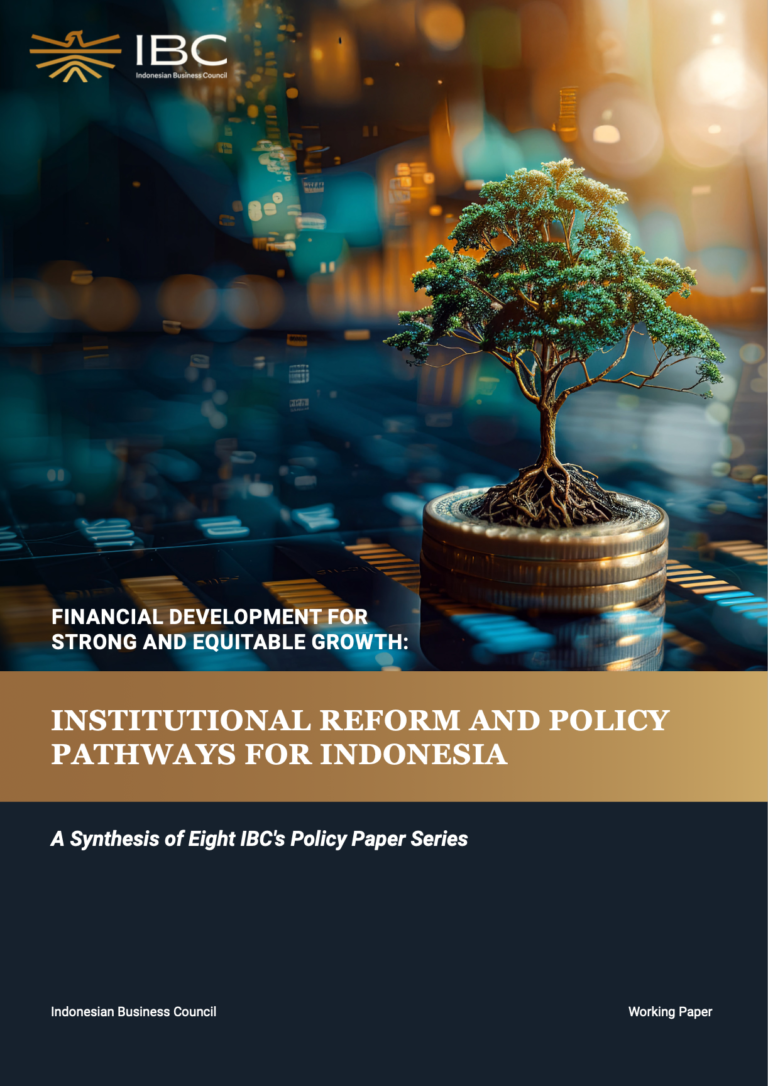The Center for Economic & Financial Development (CEFD) promotes inclusive and sustainable growth by tackling Indonesia’s core economic and financial constraints. Key CEFD initiatives include:
ECONOMY
Center for
Economic & Financial
Development
The Purpose
Economic Outlook
Financial Development
Industry
MSMEs
The Approach
From Research to Impact

Financial Development for Strong and Equitable Growth
Indonesia’s financial sector remains underdeveloped, marked by low liquidity, limited access, and high borrowing costs. This flagship policy paper by the Indonesian Business Council (IBC) outlines a roadmap to address these challenges through institutional realignment and strategic policy reform. Key recommendations include: (i) strengthening the Ministry of Finance’s role in financial sector development, (ii) refocusing OJK on consumer protection and market conduct, (iii) consolidating prudential oversight under Bank Indonesia, and (iv) introducing a unified national financial roadmap. To support depth, access, and efficiency, the paper also promotes the use of municipal bonds, REITs, digital finance tools for MSMEs, and improved credit rating systems. These reforms aim to build a more inclusive, resilient, and growth-oriented financial ecosystem.
Forecasting the Course Ahead
Indonesia’s economy in 2026 is expected to grow around five percent, supported by macroeconomic stability but constrained by a weakening global environment and narrowing policy space. Growth quality is deteriorating as household consumption softens, investment momentum weakens, productivity gains slow, and external buffers begin to narrow. Without decisive structural reforms to strengthen regulatory certainty, human capital, and market competition, Indonesia is unlikely to break out of its current growth plateau.
The Indonesia Economic Summit 2025
IES is a high-level forum designed to bring together international business leaders, policymakers, thinkers, and industry champions. The forum explores Indonesia’s current and future economic development, and how it becomes the new growth hub in the global landscape. In its first year, IES explore a range of topics, including industrialization, fiscal and monetary policy, investment, food security, energy transition, state-owned enterprise reform, international market diversification, green protectionism, human talent development, and others.
Analyzing the Issues
Agendas
Indonesia Economic Summit 2026
The Indonesia Economic Summit (IES) is the Indonesian Business Council (IBC) annual flagship event. IES is a high-level forum designed to bring together international business leaders, policymakers, thinkers, and industry...
Focus Group Discussion with International Organization, Chambers of Commerce, and Think Tank
IBC will host a Focus Group Discussion as part of the preparation of the IBC Business Outlook 2026, bringing together representatives from international organizations, chambers of commerce, and think tanks...
Focus Group Discussion with International IBC Members
IBC host a Focus Group Discussion with its Members as part of the preparation of the IBC Business Outlook 2026, bringing together business leaders to share ground-level insights on economic...
Focus Group Discussion IBC x Chief Economist
This IBC-hosted Focus Group Discussion will convene chief economists from leading banks, securities firms, research institutions, and academia to validate the interim analysis of the IBC Business Outlook 2026. The...
Capital Market Deepening Through Regulatory Strengthening and Policy Barrier Elimination
On 24 July 2025, the Indonesian Business Council (IBC) will participate in a strategic discussion on “Capital Market Deepening Through Regulatory Strengthening and Policy Barrier Elimination”, alongside key financial market...
Financial Deepening and Institutional Strengthening: Unveiling Insights from IBC Policy Papers
Inclusive growth toward Indonesia Emas 2045 requires a financial system that is stable, liquid, and responsive to the needs of the real sector. However, Indonesia's financial sector still faces several...
Fellows

Denni Puspa Purbasari
Senior Fellow

Kahlil Rowter
Senior Fellow

Telisa Aulia Falianty
Senior Fellow

Karlina Aucia Agusta
Fellow

Citra Handayani
Fellow

Adelia Surya Pratiwi
Fellow

Alifa Salsabila
Fellow






